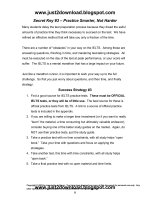Ielts sure success 4 pot
Bạn đang xem bản rút gọn của tài liệu. Xem và tải ngay bản đầy đủ của tài liệu tại đây (109.91 KB, 6 trang )
8
Copyright © 2003 by Linguistics at Nicon. You have been licensed one copy of this document for personal use only. Any
other reproduction or redistribution is strictly prohibited. All rights reserved.
These two answer choices are very similar and fall into the same family of
answer choices. A family of answer choices is when two or three answer choices
are very similar. Often two will be opposites and one may show an equality.
Example:
A.) Plan I or Plan II can be conducted at equal cost
B.) Plan I would be less expensive than Plan II
C.) Plan II would be less expensive than Plan I
D.) Neither Plan I nor Plan II would be effective
Note how the first three choices are all related. They all ask about a cost
comparison. Beware of immediately recognizing choices B and C as opposites
and choosing one of those two. Choice A is in the same family of questions and
should be considered as well. However, choice D is not in the same family of
questions. It has nothing to do with cost and can be discounted in most cases.
Hedging
When asked for a conclusion that may be drawn, look for critical “hedge”
phrases, such as likely, may, can, will often, sometimes, etc, often, almost,
mostly, usually, generally, rarely, sometimes. Question writers insert these
hedge phrases to cover every possibility. Often an answer will be wrong simply
because it leaves no room for exception. Avoid answer choices that have
definitive words like “exactly,” and “always”.
Summary of Guessing Techniques
1. Eliminate as many choices as you can by using the $5 test. Use the common
guessing strategies to help in the elimination process, but only eliminate
choices that pass the $5 test.
2. Among the remaining choices, only pick your “best guess” if it passes the $5
test.
3. Otherwise, guess randomly by picking the first remaining choice.
9
Copyright © 2003 by Linguistics at Nicon. You have been licensed one copy of this document for personal use only. Any
other reproduction or redistribution is strictly prohibited. All rights reserved.
Secret Key #3 – Practice Smarter, Not Harder
Many students delay the test preparation process because they dread the awful
amounts of practice time they think necessary to succeed on the test. We have
refined an effective method that will take you only a fraction of the time.
There are a number of “obstacles” in your way on the IELTS. Among these are
answering questions, finishing in time, and mastering test-taking strategies. All
must be executed on the day of the test at peak performance, or your score will
suffer. The IELTS is a mental marathon that has a large impact on your future.
Just like a marathon runner, it is important to work your way up to the full
challenge. So first you just worry about questions, and then time, and finally
strategy:
Success Strategy #3
1. Find a good source for IELTS practice tests. These must be OFFICIAL
IELTS tests, or they will be of little use. The best source for these is
official practice tests from IELTS. A link to a source of official practice
tests is included in the appendix.
2. If you are willing to make a larger time investment (or if you want to really
“learn” the material, a time consuming but ultimately valuable endeavor),
consider buying one of the better study guides on the market. Again, do
NOT use their practice tests, just the study guide.
3. Take a practice test with no time constraints, with all study helps “open
book.” Take your time with questions and focus on applying the
strategies.
4. Take another test, this time with time constraints, with all study helps
“open book.”
5. Take a final practice test with no open material and time limits.
10
Copyright © 2003 by Linguistics at Nicon. You have been licensed one copy of this document for personal use only. Any
other reproduction or redistribution is strictly prohibited. All rights reserved.
If you have time to take more practice tests, just repeat step 5. By gradually
exposing yourself to the full rigors of the test environment, you will condition
your mind to the stress of test day and maximize your success.
11
Copyright © 2003 by Linguistics at Nicon. You have been licensed one copy of this document for personal use only. Any
other reproduction or redistribution is strictly prohibited. All rights reserved.
Secret Key #4 – Prepare, Don’t Procrastinate
Let me state an obvious fact: if you take the IELTS three times, you will get three
different scores. This is due to the way you feel on test day, the level of
preparedness you have, and, despite IELTS’s claims to the contrary, some tests
WILL be easier for you than others.
Since so much depends on your score, you should maximize your chances of
success. In order to maximize the likelihood of success, you’ve got to prepare in
advance. This means taking official practice tests and spending time learning the
information and test taking strategies you will need to succeed.
You can always retake the test more than once, but remember that you will have
to wait a minimum of three months before retaking the test. Don’t get into a
situation where you need a higher score and can’t afford to wait, so don’t take the
IELTS as a “practice” test. Feel free to take sample tests on your own, but when
you go to take the IELTS, be prepared, be focused, and do your best the first
time!
12
Copyright © 2003 by Linguistics at Nicon. You have been licensed one copy of this document for personal use only. Any
other reproduction or redistribution is strictly prohibited. All rights reserved.
The Listening Module
The Listening module of the IELTS consists of a total of 40 questions.
There are four sections:
1. Social Needs – Conversation between two speakers
2. Social Needs – Speech by one speaker
3. Educational or Training – Conversation between up to four speakers
4. Educational or Training – Speech by one speaker
Main Ideas
Important words and main ideas in conversation are ones that will come up again
and again. Listen carefully for any word or words that come up repeatedly. What
words come up in nearly every statement made? These words with high
frequency are likely to be in the main idea of the conversation. For example, in a
conversation about class size in the business department of a college, the term
“class size” is likely to appear in nearly every statement made by either speaker
in the discussion.
Voice Changes
IELTS expects you to be able to recognize and interpret nuances of speech. Be
on the alert for any changes in voice, which might register surprise, excitement,
or another emotion. If a speaker is talking in a normal monotone voice and
suddenly raises their voice to a high pitch, that is a huge clue that something
critical is being stated. Listen for a speaker to change their voice and understand
the meaning of what they are saying.
Example:
Man: Let’s go to Wal-mart.
Woman: There’s a Wal-mart in this small town?
If the woman’s statement was higher pitched, indicating surprise and shock, then
she probably did not expect there to be a Wal-mart in that town.
13
Copyright © 2003 by Linguistics at Nicon. You have been licensed one copy of this document for personal use only. Any
other reproduction or redistribution is strictly prohibited. All rights reserved.
Specifics
Listen carefully for specific pieces of information. Adjectives are commonly
asked about in IELTS questions. Try to remember any main adjectives that are
mentioned. Pick out adjectives such as numbers, colors, or sizes.
Example:
Man: Let’s go to the store and get some apples to make the pie.
Woman: How many do we need?
Man: We’ll need five apples to make the pie.
A typical question might be about how many apples were needed.
Interpret
As you are listening to the conversation, put yourself in the person’s shoes.
Think about why someone would make a statement. You’ll need to do more than
just regurgitate the spoken words but also interpret them.
Example:
Woman: I think I’m sick with the flu.
Man: Why don’t you go see the campus doctor?
Sample Question: Why did the man mention the campus doctor?
Answer: The campus doctor would be able to determine if the woman had the flu.
Find the Hidden Meaning
Look for the meaning behind a statement. When a speaker answers a question
with a statement that doesn’t immediately seem to answer the question, the
response probably contained a hidden meaning that you will need to recognize
and explain.
Man: Are you going to be ready for your presentation?
Woman: I’ve only got half of it finished and it’s taken me five hours just to do this
much. There’s only an hour left before the presentation is due.









